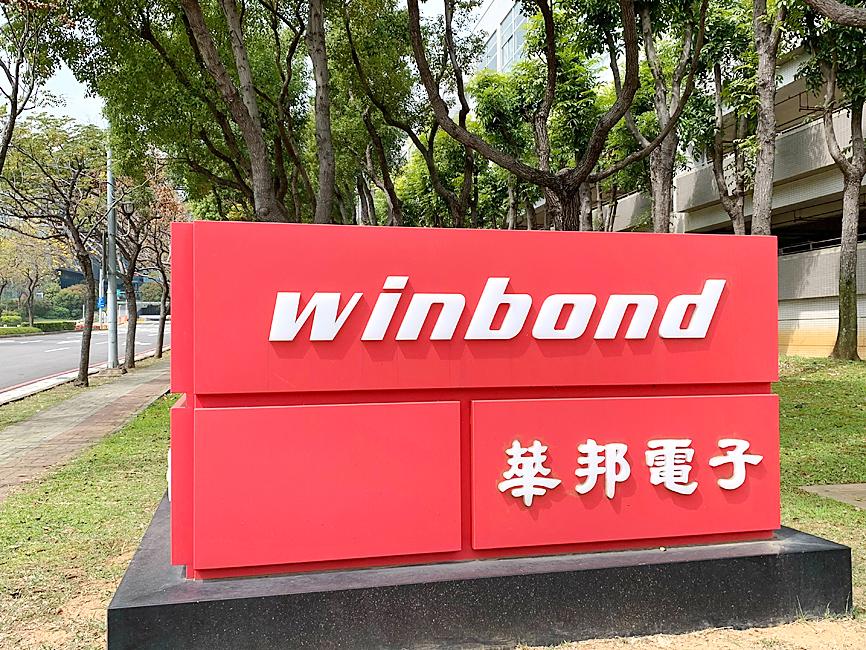DRAM chip supplier Winbond Electronics Corp (華邦電子) is forecast to increase capital expenditure by 367 percent year-on-year to US$1.65 billion this year, the biggest hike in the global semiconductor industry, where the average increase is estimated to be 24 percent, market information advisory firm IC Insights said on Monday.
US-based GlobalFoundries Inc came second in terms of spending growth, as the company’s capital expenditure is forecast to be US$4.5 billion, up 155 percent from last year, IC Insights said in a research note.
Nanya Technology Corp (南亞科技), another Taiwanese DRAM maker, was third. Its capital expenditure is forecast to be US$1.0 billion, up 148 percent from a year earlier.

Photo: Grace Hung, Taipei Times
Taiwan Semiconductor Manufacturing Co (TSMC, 台積電), the world’s largest contract chipmaker, is forecast to raise capital expenditure to US$42 billion, up 40 percent from a year earlier — the 13th biggest increase on IC Insights’ list.
Taiwan’s smaller contract chipmakers, Vanguard International Semiconductor Corp (世界先進) and United Microelectronics Corp (UMC, 聯電), are expected to spend US$865 million and US$3 billion respectively this year, up 81 percent and 71 percent from a year earlier, IC Insights said.
Vanguard and UMC ranked eighth and ninth respectively on the advisory firm’s list.
As global semiconductor suppliers rush to expand their production capacity to meet demand amid the COVID-19 pandemic, the industry’s capital expenditure is expected to reach an all-time high of US$190.4 billion this year, up from US$153.9 billion last year, IC Insights said.
“With many supply chains strained or broken during the pandemic, the electronics industry, in many cases, was left unprepared for the current rebound in demand,” it said.
“Booming demand has pushed most fabrication facility utilization rates well above 90 percent with many of the semiconductor foundries operating at 100 percent utilization,” IC Insights added.

Taiwan’s foreign exchange reserves hit a record high at the end of last month, surpassing the US$600 billion mark for the first time, the central bank said yesterday. Last month, the country’s foreign exchange reserves rose US$5.51 billion from a month earlier to reach US$602.94 billion due to an increase in returns from the central bank’s portfolio management, the movement of other foreign currencies in the portfolio against the US dollar and the bank’s efforts to smooth the volatility of the New Taiwan dollar. Department of Foreign Exchange Director-General Eugene Tsai (蔡炯民)said a rate cut cycle launched by the US Federal Reserve

Handset camera lens maker Largan Precision Co (大立光) on Sunday reported a 6.71 percent year-on-year decline in revenue for the third quarter, despite revenue last month hitting the highest level in 11 months. Third-quarter revenue was NT$17.68 billion (US$581.2 million), compared with NT$18.95 billion a year earlier, the company said in a statement. The figure was in line with Yuanta Securities Investment Consulting Co’s (元大投顧) forecast of NT$17.9 billion, but missed the market consensus estimate of NT$18.97 billion. The third-quarter revenue was a 51.44 percent increase from NT$11.67 billion in the second quarter, as the quarter is usually the peak

The US government on Wednesday sanctioned more than two dozen companies in China, Turkey and the United Arab Emirates, including offshoots of a US chip firm, accusing the businesses of providing illicit support to Iran’s military or proxies. The US Department of Commerce included two subsidiaries of US-based chip distributor Arrow Electronics Inc (艾睿電子) on its so-called entity list published on the federal register for facilitating purchases by Iran’s proxies of US tech. Arrow spokesman John Hourigan said that the subsidiaries have been operating in full compliance with US export control regulations and his company is discussing with the US Bureau of

Pegatron Corp (和碩), a key assembler of Apple Inc’s iPhones, on Thursday reported a 12.3 percent year-on-year decline in revenue for last quarter to NT$257.86 billion (US$8.44 billion), but it expects revenue to improve in the second half on traditional holiday demand. The fourth quarter is usually the peak season for its communications products, a company official said on condition of anonymity. As Apple released its new iPhone 17 series early last month, sales in the communications segment rose sequentially last month, the official said. Shipments to Apple have been stable and in line with earlier expectations, they said. Pegatron shipped 2.4 million notebook